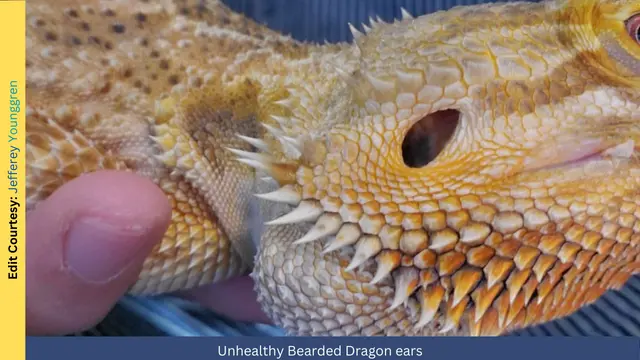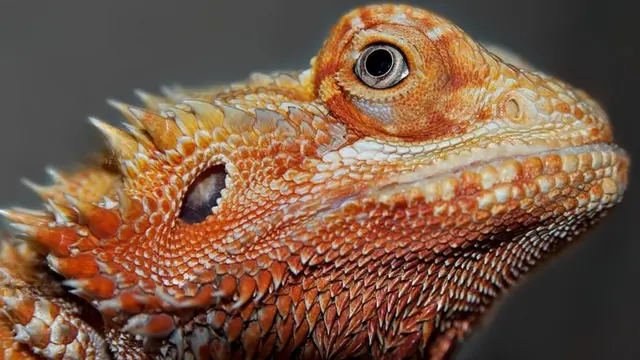Bearded dragons are unique and fascinating creatures that make great pets. They are friendly and curious animals that can provide hours of entertainment.
One area to pay particular attention to is their ears.
The symptoms of unhealthy bearded dragon ears include swollen tympanic membranes, film covering ear holes, discharge, black or brown spots in the ears, head tilting, and loss of balance.
What are Bearded Dragon Ears?
Bearded dragons have two ears located on the sides of their head. These ears are small, oval-shaped openings that are covered by a thin membrane. The membrane helps protect the ear from debris and insects while still allowing sound to enter.

Signs of Healthy Ears
The first step in identifying unhealthy ears is to understand what healthy ears look like.
- Healthy bearded dragon ears will be clean and free of debris.
- The membrane covering the ear should be transparent and not discolored.
- Bearded dragons will also have a range of hearing that allows them to respond to sounds and movements around them.
- The ears of healthy bearded dragons should not be swollen, discharged, or black or brown.
- There should be no swelling of the tympanic membrane, the film that covers the ear holes.
- Ear infections can also cause hearing loss, and healthy ears do not experience it.
Signs of Unhealthy Ears

Now that we know what healthy ears look like, let’s take a look at some signs of unhealthy ears in bearded dragons.
Discoloration
If the membrane covering the ear is discolored, it could be a sign of an infection. The membrane may appear red, swollen, or have a yellow or white discharge. This could be a sign of an ear infection, which should be addressed immediately.
Debris or Foreign Objects
Poor ear hygiene can lead to debris or foreign objects in the ear. Dirt, dust, or other small objects can get lodged in the ear canal and cause discomfort or even infection. Careful cleaning of the ears can help prevent this.
Loss of Hearing
If a bearded dragon seems to be ignoring sounds around them or not responding to movement, it could be a sign of hearing loss. This could be caused by a buildup of wax or debris in the ear, or even an infection. If hearing loss is suspected, a visit to a veterinarian is recommended.
How to Clean Bearded Dragon Ears
Cleaning a bearded dragon’s ears is an important part of maintaining its overall health. To clean the ears,
- First, dampen a cotton swab or cloth with warm water.
- Gently wipe the ear membrane to remove any debris or wax buildup.
- Be careful not to push the debris further into the ear canal, as this can cause infection.
If there is a significant amount of debris, it is best to have a veterinarian clean the ears.
Conclusion
Healthy bearded dragon ears are an important part of their overall health and well-being. By understanding what healthy ears look like and being able to identify signs of unhealthy ears, you can help keep your bearded dragon happy and healthy. Remember to clean their ears regularly and seek veterinary attention if necessary.
FAQs
Can I use Q-tips to clean my bearded dragon’s ears?
It is not recommended to use Q-tips, as they can push debris further into the ear canal.
How often should I clean my bearded dragon’s ears?
It is recommended to clean their ears once a month or as needed.
How do I know if my bearded dragon has an ear infection?
Signs of an ear infection can include redness, swelling, or discharge from the ear. Your bearded dragon may also seem to be in pain or discomfort.
Can hearing loss in bearded dragons be cured?
Hearing loss in bearded dragons can sometimes be cured by removing debris or treating an infection.
Can hearing loss in bearded dragons be cured?
Hearing loss in bearded dragons can sometimes be cured by removing debris or treating an infection. However, if it is caused by damage to the inner ear, it may be permanent.
What can I do to prevent ear infections in my bearded dragon?
To prevent ear infections, make sure to keep their enclosure clean and free of debris. Also, avoid exposing them to loud noises or sudden changes in temperature, which can stress their immune system and make them more susceptible to infections.
Is it normal for bearded dragons to scratch their ears?
Occasional scratching is normal, but if your bearded dragon is scratching excessively or seems to be in pain, it could be a sign of an ear infection or other health issue.
Can bearded dragons hear well?
Yes, bearded dragons have a good sense of hearing and can detect sounds from a distance. However, they rely more on their vision and sense of smell to navigate their surroundings.
Can I use ear drops to treat an ear infection in my bearded dragon?
It is not recommended to use ear drops or any other medication without consulting a veterinarian. Using the wrong medication can make the infection worse and poten
